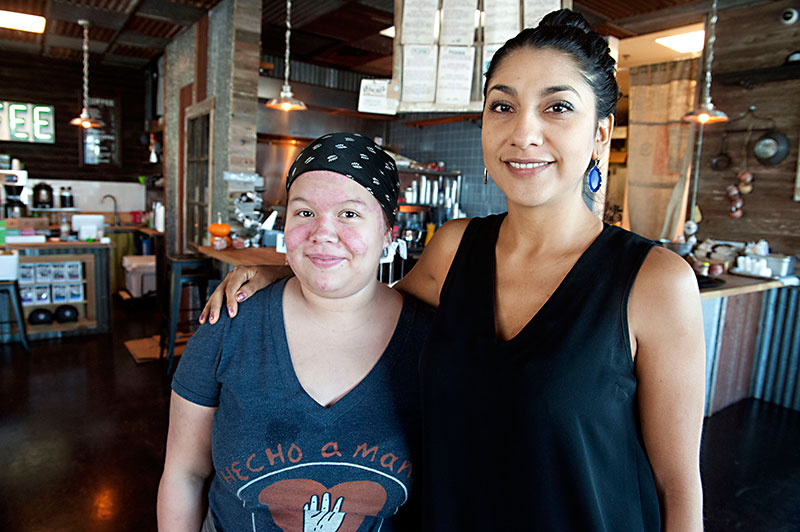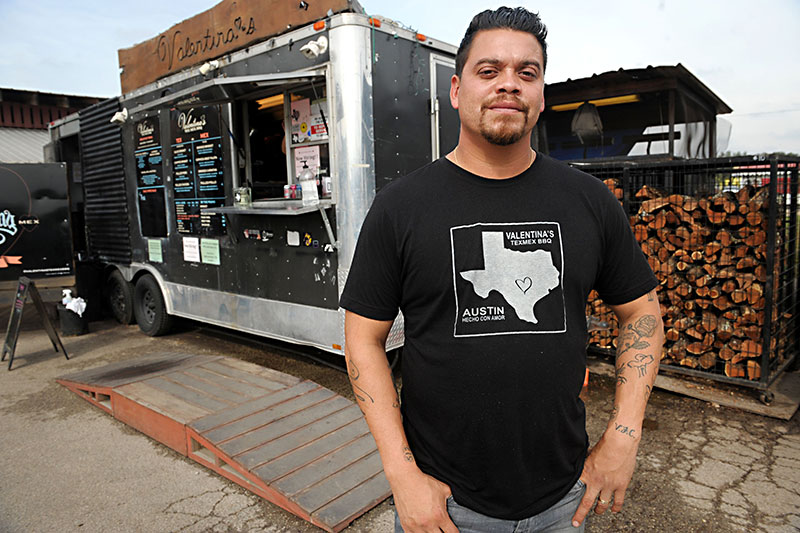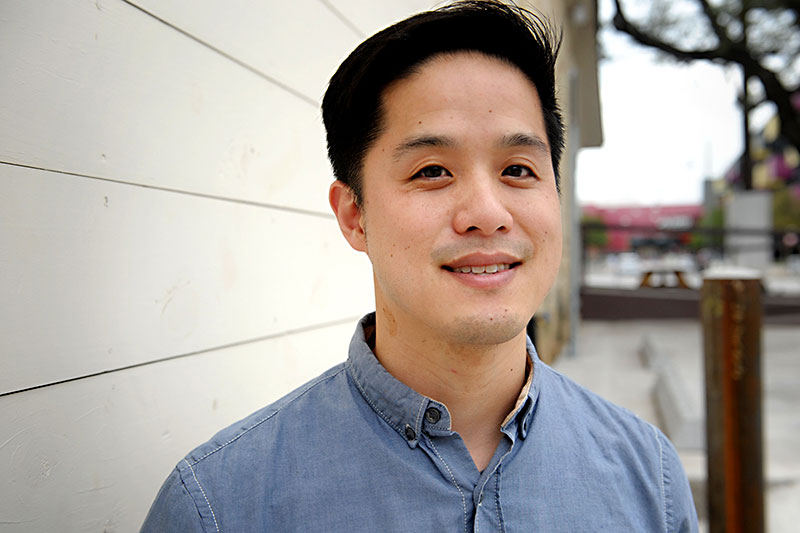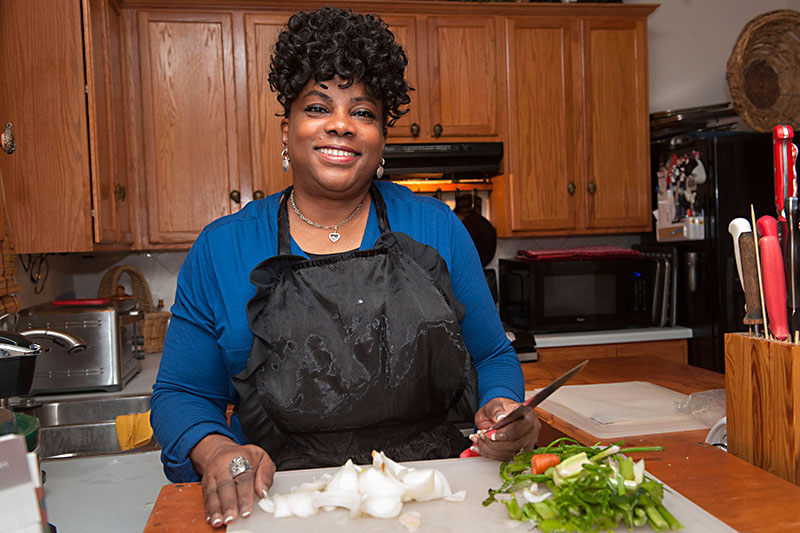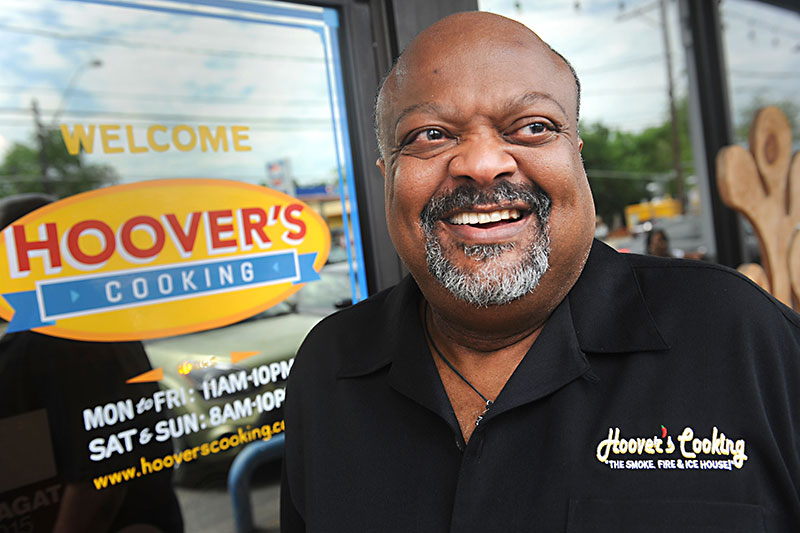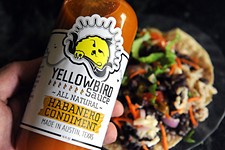Who Is Cast in the Story of Austin Food?
Eight underrepresented views from the local food scene
By Nina Hernandez, Fri., Nov. 17, 2017
Rising property values and stiff competition mean restaurants live and die by media exposure. It's a harried cycle revolving around restaurant openings, closings, and reviews, and the coverage is disproportionately leaving out minority-owned food businesses. Though it's often difficult to tell by perusing the pages of major publications, people of color are doing much of the restaurant work, and it's going to take a concerted effort on the part of the entire food media to ensure those voices are truly heard. The Chronicle talked to eight members of Austin's food community about their personal experiences with this lack of representation, and while it's certainly not a comprehensive list, and it doesn't provide answers, these very personal testaments serve to jump-start a much-needed conversation.
Taco, Please; Hold the Culture
Taco journalist Mando Rayo is a pioneer in his field. For his book The Tacos of Texas (released with writing partner Jarod Neece last year), the El Paso native spent countless hours in taquerias, restaurants, and food trucks across the state to bring the stories of taco crafters to the general public. But in Austin, where he's spent the last two decades, Rayo sees a food media that he says still struggles to properly represent the people of color operating under its nose. "That's one of the reasons I started," he says. "To make sure our stories were being told." The Tacos of Texas Instagram is Rayo's way of presenting the real stories behind these food trucks and kitchens, but sometimes he feels like the greater Austin food community doesn't want to know the real heritage behind those perfectly edited snapshots. "[It's like] 'Give me the taco, but hold the culture,'" Rayo says.
For so many Latino chefs – taco or otherwise – culture and heritage are essential ingredients in the foods they prepare. Rayo notes that this year's "Best of Austin" featured a hybrid Tex-Mex/taqueria category, which merges a significant amount of cuisine into one tiny box. One of his book's best accomplishments is that the overwhelming majority of those featured are Latino. "Those people are probably not the first choice for a Texas Monthly interview," he says. "You don't see as many food writers or writers that are kind of creating their own, but slowly we're seeing more. In Texas, there's probably five or six people doing tacos." Rayo adds, "The thing is, food is personal for people. When you disparage a certain cuisine – whether it's a smell or a style of tortilla or a style of cooking – then you're disparaging people's history, their moms, what they grew up cooking at home."
Jose Velasquez, who grew up watching the changes on the Eastside, says, "To me that's why people like Mando are so necessary: They highlight the mom and pop." Though he acknowledges that Rayo would never take credit, he says the taco journalist's work has been instrumental in nurturing many small businesses that would have otherwise been overlooked by mainstream media. "I really believe Mando – whether he realizes it or not – has done a huge service to this city to help maintain the mom and pop feel of Austin. Because I'm four generations in East Austin, and it's losing its identity pretty rapidly," he adds. Many of the places the media frequently recommends, he says, are out of his price range, and the coverage itself feels cliquish. "I try something once a year, but they definitely wouldn't be my go-to on Saturdays," he says. "I eat at Joe's Bakery, and Cisco's, and Marcelino's Pan y Vino. I think it's the folks that write about it venturing outside of their circles and establishing those relationships. They definitely need Armando to take them around and show them places where you don't have to pay an arm and a leg to get good food."
Live by Press, Die by Press
It took Reyna and Maritza Vazquez three full years to build a clientele at Veracruz All Natural. When the two opened their first food truck, they would sometimes go a full day without a single customer. They persevered, even if the cash register was empty. At that point, they didn't have social media, and they certainly didn't have money for a marketing campaign. So early media coverage, like a Chronicle article featuring their tortas, had a profound impact on their sustainability because not every business gets that exposure.
Reyna says a Dominican friend of hers with a food truck concept had a similar lack of resources, and his venture quickly fizzled with the lack of attention. "The guy put his heart and soul in his food," she says, "but he never got any press. He didn't have the money to pay for someone to come and take pictures of his food, and now he's no longer open."
Overall, Reyna says she feels included in Austin's food community, and indeed the group has enjoyed consistent coverage and a steady following that's led them to the brick-and-mortar, which she says was the ultimate goal. Reyna's niece Lis-Ek Mariscal, who works in the restaurant, says there is truth to Rayo's assertion that sometimes in Austin, culture is separated from food. Veracruz is sometimes misunderstood by the community. Customers occasionally stroll in expecting Tex-Mex, and recoil when they don't find queso on the menu. "People don't understand the difference between our tortillas sometimes, or about the way we top our tacos, because they're different," she says. "They're made the way my mom would make them at home for me in the mornings." Sometimes customers are so appalled by the food from the family's native Veracruz that they become angry. "We get people who are rude, people who don't buy anything, people who tell us they're not going to come back," Lis-Ek says. "There are people who make rude comments on social media, [like] Yelp. It's hurtful because we put so much work into this place, and it's hurtful to my grandma because these are her recipes."
"We also get a lot of people that love it, that are so happy with the different menu here, and that are willing to try everything on the menu. We have people who come every day and they just go through the menu every day. It is accepted, but it's not fully understood." Reyna says that a decade ago she could go to East Austin for authentic food. "Now, it's not like that," she says. "Not for people of color."
Sunday Barbacoa
San Antonio-born Miguel Vidal says that, although he attended St. Edward's to fulfill his family's expectations, it was clear from an early age that he was born with an entrepreneur's spirit. As a kid, he would sell candy at school, and his mom and brother made extra money selling homemade tacos. He grew up on homemade tortillas, chile, chalupas, refried beans, and brisket smoked by his father in the backyard. "I could not get food that I could get back home," he says. "I couldn't get food that I wanted to eat. I kind of felt like the food here was being cooked and marketed for non-Latino or non-Mexican people to enjoy – and to try and make money off of that – so that it was more accepted or wanted by them. You see that with a lot of the popular taco shops here like Tacodeli or Torchy's, where you have those influences, but it's really Americanized."
Vidal co-owns Valentina's Tex Mex BBQ on Manchaca Road, and the menu – featuring a down-home brisket taco – is the culmination of those experiences and influences. "What I wanted to do is be able to make food that I made at home, that could touch everyone, and that could remind them of their uncle, remind them of their grandfather. You create some sort of home feeling with the food and you put the love into it. If I was to share what I was eating at home with everyone else and make it special for everyone, they would enjoy it."
For the most part, he doesn't focus on how the food media covers or perceives his business (though he's appreciative of pieces in Eater Austin, Texas Monthly, and The New York Times), and he said his nature is to focus on the work, rather than self-promotion. Upon further reflection, though, he admits he didn't receive any local coverage for a recent presentation to the Southern Foodways Alliance Symposium in Oxford, Miss. His Sunday barbacoa is the best in town, he believes, but he's not beating food critics back with a stick to feature it.
With Growth, New Opportunities
Food blogger Peter Tsai moved here more than a decade ago from Atlanta, and the food scene feels less diverse – something exacerbated over time by the closings of South Austin locations of staples like La Feria and Casa Garcia's. "For a long time people would say, 'What's the best Asian restaurant in Austin?' And they'd be like, 'Oh, it's Uchi.'" He points out that Uchi is run by the Florida-born Austin transplant Tyson Cole.
For Austin's Asian-American community, he says, the city's growth has brought more authenticity and variety to the table. International brands like H Mart, a Korean supermarket, are on their way to serve a growing population of Asian-American Austinites in the north side of the metro. When Tsai first arrived, he had to drive to Houston to get certain kinds of food because the options here were so limited. "That's changed," he said. "At least for the immigrant communities, there's opportunity."
Does the buzz surrounding that opportunity permeate the mainstream press? "Not necessarily," he says. "The people they focus on most are the cool and hip restaurants where the in-crowd would want to go. Most of the food press, they usually focus on the chef-driven culture. The cool dudes. If you're just opening a regular Chinese restaurant in Cedar Park, they're probably not going to cover you. But if you're opening something on South Lamar or something on West Sixth – or even East Sixth – they'll probably talk about it."
"Part of it's just straight-up racism"
Asked about how people of color are covered by the Austin food media, Kitchen Diva cookbook author and blogger Angela Shelf Medearis points to the Chronicle's 2017 First Plates issue. When a friend of Medearis' came to town and asked for restaurant recommendations, she pulled out her copy and scanned the listings for any black-owned restaurants. There were none. And that's not atypical of how food media represents Austin, she says. "It's not a good representation at all. There's very little effort made to even go out and visit those places that are owned by nonwhites. There's very little recognition in newspapers or magazines or anything like that, unless it's Black History Month or something like that, and they'll have someone in to do a soul food demo."
That's a major problem with how the press interacts with African-American food. It's generally limited in the public consciousness to the ambiguous soul food category or barbecue. "Part of it's just straight-up racism," she says of the general population's ignorance of black chefs and their contributions to the culinary world. "It was a calculated move to belittle the contributions that have been made by these Africans and African-Americans, starting from the time we landed here, pretty much up until now. What they do is, instead of referring to our cuisine the way that they do other cuisines based in other countries ... it's referred to as soul food, which is not definitive, and not accurate. It's referred to as the bad stuff that black people eat that makes them unhealthy."
Hope From Hoover
Having been in the business for more than four decades, Hoover Alexander (of Hoover's Cooking) has seen the food scene change in innumerable ways. Some of the new trends, he says, like the farm-to-market craze, he appreciates because it's reminiscent of how his parents and grandparents filled their tables. But there are two sides to that coin. He also considers those without the discretionary income to frequent many of those spaces. "You kind of see the tale of two cities through the food prism," he says.
At Rayo's "take the taco, hold the culture," line, Alexander belts out a hearty laugh. It resonates. "There's a lot of sterilization of culture," he says. Another contributing factor, he says, is the fact that many of his peers in the Seventies, awash in new opportunities after integration, chose jobs outside of the restaurant and other stations to which their parents and grandparents had been relegated. "Man, every time one of the black restaurants would close, I would feel like it was a death in the family," he says. "It's a shot in the gut – several of them that have closed the last decade, from Ms. B's [to] Tony's [Southern Comfort], and some of these other folks." He also cites the food truck trend as a way entrepreneurs of all colors are finding their way into the industry. "So there's definitely some hope," he says.






